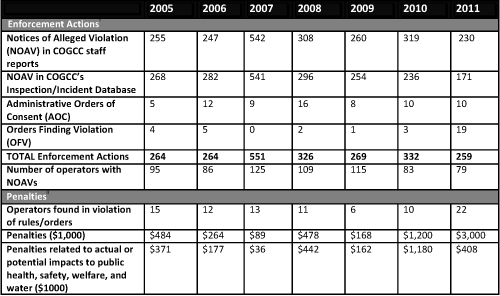Colorado Oil & Gas Enforcement - Enforcement Actions
Colorado penalties are weak compared to other states
When oil and gas rules are violated, most states have the ability to assess “civil” monetary penalties (i.e., fines).
The purpose of penalties is two-fold:
- To deter violators, and
- In some cases to provide compensation for harm, such as pollution.
In Texas, a regulatory review of enforcement practices concluded that penalties play a key role in deterring and punishing violators, thus increasing compliance.
Compared to other major oil and gas producing states, Colorado’s fines for oil and gas violations are weak.
According to COGCC rules, operators may receive a maximum fine of $1,000 a day for each day that a violation continues. This is similar to New Mexico, which hasn’t changed its penalty schedule since 1935.
Pennsylvania, on the other hand, has the ability to issue a $25,000 fine (plus $1,000/day for each day of continued violation) for conventional wells, and $75,000 (plus $5,000 per day) for unconventional gas wells. Texas also has stronger penalty provisions – its Railroad Commission can issue fines of $10,000 per day for oil and gas violations that pertain to safety or the prevention or control of pollution.
Very few violators are penalized
As seen in the below chart very few operators in Colorado receive penalties for violating rules.
In 2010, just ten operators received penalties, even though 319 NOAVs were issued that year to at least 83 different operators.
In 2011, only 22 operators received penalties even though 79 operators received a total of 230 NOAVs.
It’s unclear if this is a resource issue (i.e., enforcement actions require more staff time), or if there is some other reason that COGCC is not fully utilizing its enforcement powers against violators.
Colorado Enforcement Actions and Penalty Data

Click chart for larger, footnoted version
Fines for violators, even repeat violators, are low
Between 2005 and 2009 less than $500,000 in penalties were assessed per year. In 2010 the commission reported collecting three times the typical amount because “the COGCC pursued a backlog of enforcement matters, most of which involved incidents that had occurred in previous years.” Similarly, in 2011 “COGCC continued to pursue a backlog of enforcement matters.”
Therefore, one cannot assume that the higher total amount of penalties assessed in 2010 and 2011 are going to continue in future years.
A recent fine issued to Aspen Operating LLC (“Aspen”) suggests that COGCC is continuing its weak application of penalties. At a May 2011 hearing COGCC staff recommended that a $200,000 penalty, the maximum allowed under its rules, be assessed against Aspen for 20 alleged violations. Aspen failed to show up for the May hearing. When the case was re-heard in January 2012, the Commissioners reduced the fine to $20,000. This is yet another example that suggests to the public and operators that violating COGCC rules results in minor consequences.
COGCC should assess more fines, increase maximum penalties and hire more enforcement staff to ensure that penalties actually deter violators and better protect public health, safety, welfare and the environment.
For more information:
- Earthworks: Enforcement Report - COGCC: Inadequate enforcement means current Colorado oil and gas development is irresponsible. Report
- Earthworks: Colorado Oil & Gas Enforcement. Web page
- Earthworks: Colorado Oil & Gas Enforcement - Inspections. Web page
- Earthworks: Colorado Oil & Gas Enforcement - Enforcement Actions. Web page
- Earthworks: Colorado Oil & Gas Enforcement - Violations. Web page
Endnotes
1: Data on number of operators penalized from: COGCC. 2010 and 2011 Reports to Water Quality Control Commission and Water Quality Control Division of the Colorado Department of Public Health and the Environment. NOAV data from: COGCC Staff Reports. Data on Operators with NOAVs from: COGCC Inspection/Incident Database. Selected NOAV. Searched 1000 most recent reports. Counted number of operators receiving NOAVs in 2010 and 2011.
Tagged with: penalties, fines, enforcement, colorado, cogcc
Follow Earthworks